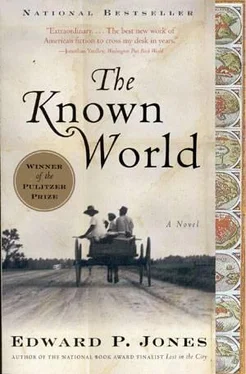Later, after the disappearances, Skiffington would question Elias the longest, and Elias, of all the adults, would hold nothing back. Celeste said the least. “I know nothin bout Moses and any of them,” she said to Skiffington. “Don’t say things to him, Elias,” Celeste would say after Skiffington came to the lane the second time. “Please, don’t, husband.” “I got to,” Elias said. They would be on their pallet, their children sleeping all around them. It would be cold outside that night and the fire in the hearth was going strong. “It’s in my heart and I can’t keep it there. Not for nobody can I keep it there.” “Please, Elias…”
One day after Bennett gave him new pants and a shirt, Moses returned to the woods to be with himself for the first time since his master died. When it was done, he lay and watched the stars twinkling between the swaying leaves of the trees around him. The world was in the last days of summer and it gave off a fecundity that was pulling him into sleep. It was a moment of such peace that he said, in a whisper, that if he were to die now, he would not hate God for it. He was ready to get up and dress when he heard a twig break, and he knew right away that it was not an animal making its way, oblivious to him and what he was doing. He raised up on one elbow and waited. He was all too aware now that he was naked and he held his pants about his midsection. The weight of a human being released the broken twig and Moses heard the stick give out an almost imperceptible sigh. “Who out there?” he asked. “Priscilla? That you?”
He stood and dressed, and as he did he felt the person moving away. He went in the direction of the movement, then he ran. When he was out of the woods, he was alone and there was nothing but the crops and the crickets telling him things he did not want to hear.
When he reached the lane, he found Alice in the middle of the path, on her knees and praying. He said, “Get on home, you.” She did not acknowledge him. “Get home if you know whas good for you.” He came up behind her and toed her left thigh. “You hear me, girl?” Whatever she was saying he could not understand, for it was more gibberish than usual. “You get home or I’ll put the strap to you.” He went on by and when he was at his door, he looked back and saw her standing. She turned fully around once and stopped, and he knew that it had been her in the woods. She came toward him and walked by, disappeared into the area that would take her out to the road. He heard her clearly now:
I met a dead man layin in Massa lane
Ask that dead man what his name
He raised he bony head and took off his hat
He told me this, he told me that.
It came into his head to go after her and strike her down, but when he got to the clearing beyond the cabins she was gone. He still heard the chanting but the more he stood there, the less certain he was about what he was hearing-her actual chanting or the memory of her chanting. And the sound of her voice seemed to come from everywhere.
He followed her the next night, resisted the need to go back to the woods and hid behind the barn until he saw her leave her cabin. Within minutes of her getting to the road, she had disappeared. He went down the way he thought she had gone, and in several more minutes, it occurred to him that he was farther from the Townsend plantation than he had been in many years. He knew everything about the plantation but what was just beyond Caldonia’s boundaries was alien to him. Moses looked about at the unfamiliarity and said quietly, “Alice? You there?” He called loudly. “Alice, you come here so I can see you. Come out here now, girl.” The sound of galloping horses came from up ahead and he ran back toward the plantation, but he felt the horses coming closer and dove into a stand of bushes beside the road. The thick summer dust they riled covered him and the bushes and he felt himself choking. He buried his mouth in the bushes and bit down into thorny leaves, afraid that even with the noise of their galloping, the white men on the horses would hear him coughing dust. His mouth bled. The horses and their men passed, but when he had coughed out the dust and blood and got to the road again, he was not as sure which way was the plantation. He was at a crossroads of sorts and he shivered to know he had put himself there, that he had followed a woman whose neck should have been wrung long ago. He turned about. One road looked to be the correct one but when he looked at the other three, they seemed right as well. The stars and the moon were as bright as the night before but, as Elias was to say to Skiffington, he was “world stupid,” and so the heavens meant nothing to him. “Sweet Jesus,” he said, walking in the direction the horses had gone. But that direction produced a small stand of trees that he had not passed earlier. “Sweet Jesus.”
He stood, trying to clear his head and spitting out blood. The sound of the horses and their patrollers was now a soft rumble along the ground. “Alice, come out here, I say.” He heard a twig break along one road, a sound almost identical to that of the night before, and he went down that road.
He got to the plantation a half hour later, his mouth swelling from the bites of the thorns. At Alice’s cabin he put both hands on the door, ready to push it in, and he knew immediately that she was inside, asleep or well on her way. He stepped back, out into the lane, and looked around. If her, then why not others who might have seen him in the woods? What would they think and what would they tell the mistress? Moses be alone out there in them woods, playin with hisself. No woman, no nothin, just hisself and hisself alone. They be talkin bout Alice, Missus, but Moses the one you gotta worry bout. Moses went toward his cabin. There were no windows on any cabin, for Henry would not have paid for the glass, but he felt their eyes watching him through the doors, through the walls. I see Moses walkin down the lane. I see Moses walkin down the lane. I see Moses layin in that lane. By the time he reached his own door, he could barely open his mouth. “Moses?” Priscilla said when he entered. She had been dreaming that she was in a strange house, not her cabin, not her mistress’s house, and someone had knocked and she had gone to open the door and welcome the stranger to what she realized as she walked was her own house. “Welcome to my house,” she told the stranger. Moses shut the cabin door and grunted once and Priscilla turned over and tried to go back to sleep.
By morning much of the swelling had gone down and he led the slaves out into the fields. Alice was no different than she was on any other day: a good worker who didn’t sass and who seemed to go up and down a furrow in the time it took most people to turn around good. Occasionally, he would rise from his own work and look over at her, but, as always, she was in her own world. When the wind was right or when there were no songs from anyone, he could hear her: “I’m gonna pick you. I’m gonna pick you. I’m gonna leave you be till you say my name just right.”
That evening he changed and washed at the well and put on his new shirt and britches to report to Caldonia. The work of another day had gone well, he told her. He sat back in the chair and she asked him for the first time if he, too, wanted coffee. He said yes and Loretta brought him coffee in a cup that was identical to the one Caldonia had.
“I worry bout this Alice traipsin off every night,” he said near the end of the meeting. “She might need lockin up every night just so them patrollers don’t do somethin to her.”
“The sheriff and his patrollers have said nothing to me. Has someone said something to you, Moses?”
“Why no, Missus. But she been doin this too long. A crazy woman be a disruption to peace and harmony, I’d say. Evbody else start wantin to act crazy, too.”
Читать дальше












